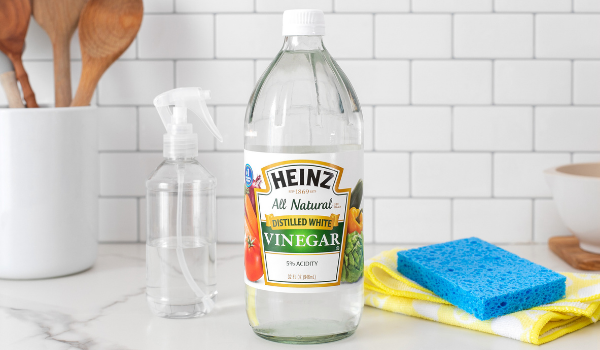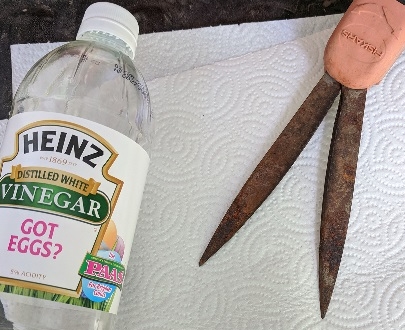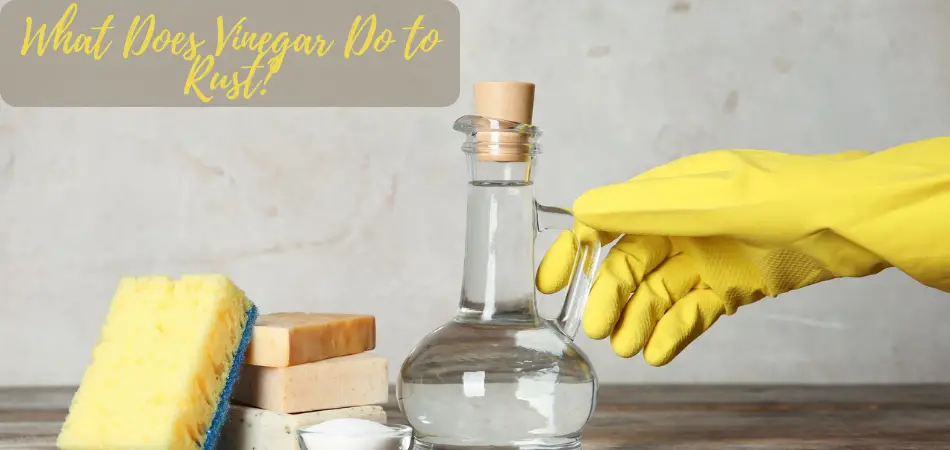Rust is one of the major considerations in the investment of metals. Alloyed metals or ferrous metals which contain irons eventually react with moisture to cause rust and consequently damage the metal or its products if not removed or treated. So, what does vinegar do to rust?
Vinegar is great for cleaning and degreasing, but it also has properties that allow it to loosen and remove rust. Vinegar’s acidity makes it a powerful homemade rust remover.
In the treatment of rust, some persons or professionals advise using vinegar as capable of removing rust and restoring the rusted iron or metal to its natural state.
In this article, I shall take you through what vinegar does to rust. I shall also answer such questions as to whether it can remove or treat rust or not and how you can use it effectively to treat your metal when it sustains rust.
What Is Vinegar and How Does It Work?
Vinegar is a solution of liquid and acetic acid or ethanol. Vinegar is considered healthful and can be consumed. It is also used as a seasoning because of its sharp taste.

Vinegar is made by adding bacteria to alcohol or sugar and allowing time for fermentation so that it turns sour and becomes acetic.
Vinegar contains acetic acid, popularly known as ethanol and this makes it useful for domestic as well as industrial uses when it comes to the issues of cleaning and treatment of rust.
At home, vinegar is usually used to wipe stains which are in themselves acidic in nature. Dog urine or cat’s which stain rooms and carpets are equally taken care of with vinegar. Although it has a concentrated smell, the smell can equally serve to keep pets away from places they are not wanted.
Can Vinegar Remove Rust?
Vinegar contains acetic acid which is written as (CH3COOH). It is this acetic acid that reacts with rust (FeOOH) to give salt and water (Fe(CH3COO)3) in a process called neutralization. It is this chemical reaction process that defines how vinegar removes rust.

Vinegar is effective in the treatment of stains ranging from pets urines to armpit sweat stains. Beyond these minor stains however, vinegar can be used to treat and remove rust from your metal and restore it to its normal state. The process is simple and there are different types of vinegar and this is what you need to know if you are looking to treat your rust with vinegar.
There is wine vinegar, rice vinegar, coconut vinegar, balsamic vinegar and white vinegar. Among these different types, the white vinegar is best for your rust treatment.
When the rust material or metal is soaked in white vinegar, a chemical process in which the rust begins to react with the vinegar is activated. This reaction leads to the dissolution of the rust. Once the rust is dissolved, sandpaper or any other pad can be used to scrub off the dissolved rust and the metal can be polished back into shape.
If the rust material is handy or as small as can be contained in a bowl, it is advised to soak the rust part in a bowl containing white vinegar and allow for about twenty to twenty-four hours. At this point the rust will have been dissolved by the acid, and all you need to do is wipe the softened or dissolved rust with a pad or paper.
If the rusted object is a large one, then you may need to devise an alternative to soaking it in vinegar. Simply spray the white vinegar equally on the surface of the rusted material, making sure all the rusted parts are touched by the vinegar.
In situations where the vinegar is poured on the rusted metal instead of the metal being soaked, then more time has to be allowed for the vinegar to act on the rust and dissolve it before cleaning.
Sometimes, especially if you do not want to wait for the rust to soften by itself, you can soak a piece of cloth in the vinegar and scrub on the rusted parts yourself. The only issue here is that more energy will be demanded for the scrubbing.
In scrubbing off the rust from your metal, ensure you observe safety measures. For instance, make sure you wear your professional gloves. Abrasive materials are preferred for this scrubbing, at least, they make the work easier.
When you are done rubbing off the rust, you need to make another solution of water and a cup size of baking soda. The now rust free metal may be deeped right into the solution or the solution evenly spread over the metal. However, the essence is to neutralize the acetic acid in the vinegar solution.
You may also scrub the metal again if there are traces of rust still remaining somewhere. The metal then has to be properly cleaned so that it doesn’t contain as much moisture as can lead to another reaction that might lead to rust. This moisture cleaning can be done using denatured alcohol.
It is advisable to treat the metal parts and to repaint it in such a way that it doesn’t face another rust reaction.
The good thing about vinegar is that it is a very simple solution which you can make by yourself. It is quite cheap and very effective.
Simply get a big container filled with white vinegar ensuring that the container is not one that reacts. Introduce a cup of table salt and turn the solution until they blend thoroughly. The essence of the salt is to increase the capacity of the acid in the vinegar. Once this is done, your solution is ready for use in effectively treating rust.
Conclusion
What vinegar does to rust is that it removes and cleanses it. It is one thing to treat or remove the rust on your metal or your jewelry. It is another to do so through an affordable means.
Vinegar affords you the two at once. Vinegar is an effective means of removing rust. Its acetic acid reacts with rust so that it softens it and all you need to do is run it off and your metal or Jewelry will return to normal.


